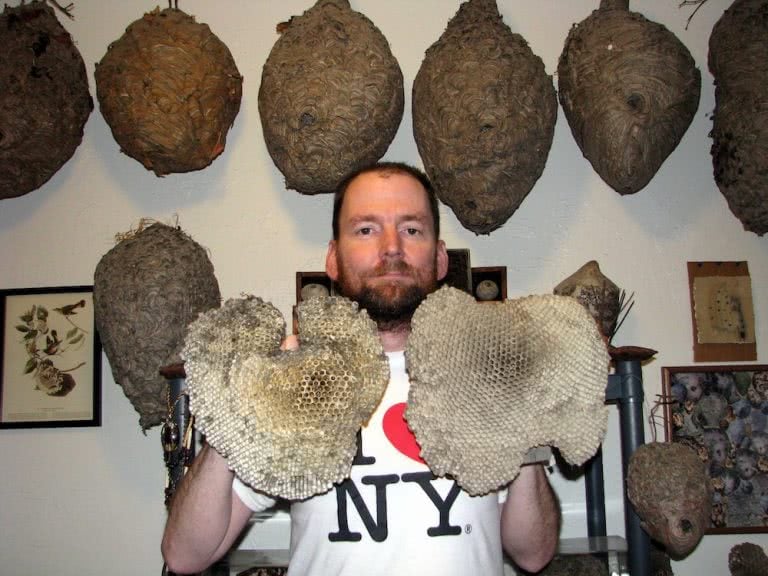There is likely no insect more misunderstood or wrongfully despised than the wasp. If one buzzes by your barbecue, it’s often met with screams of “Kill it with fire!” or toxic clouds of pesticide.
The truth is, most wasps are actually beneficial insects that pollinate flowers and hunt destructive bugs like white flies or cockroaches. They rarely pose any threat to humans unless you disturb their nests and provide important balance to the ecosystem.
That’s why Terry Prouty, a 48-year old man from Tulsa, Oklahoma, has made it his life mission to educate people on the incredible benefits and fascinating life cycle of wasps.
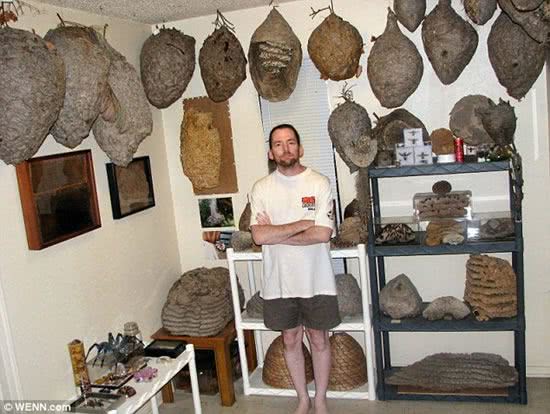
Some people collect stamps or artwork. Prouty collects masterpieces of nature, stunning nests built by the first creatures to invent paper: wasps. By now, he has over 100, which fill a room in in his apartment.
He spends his spare time on insect-dedicated Facebook groups helping strangers identify the wasp specimens they encounter, and spreading the message that wasps aren’t all bad.
Collecting these paper nests has helped Prouty cope with his debilitating Social Anxiety Disorder, or SAD, which makes it difficult for him to socialise or talk on the phone. But he was brave enough to speak with The Brag and share his passion for one stigmatised insect. The following interview has been edited for length and clarity.
The Brag: What kickstarted your passion for wasps? What do you like specifically about wasps?
Terry Prouty: They build incredible nests I think are masterpieces of nature. It’s so amazing that creatures with brains the size of a grain of sand could build something that’s so intricate.
Most people think of wasps as pests, but they actually benefit mankind and the environment in many ways. They help control bug pests, preying on spiders, flies, garden pests. To cut down on the use of harmful pesticides is healthier for our environment—it’s much better for a gardener to allow a wasp nest to grow on his property and rather than spraying poison on the vegetables.
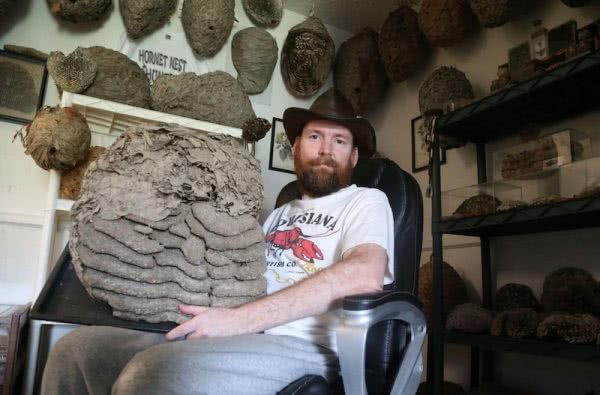
Some places around the world people use wasp larvae and pupae as a nutritious food source of protein. The benefits to humans far outweigh the harm. I’ve made it my mission in life to educate people about wasps so these beneficial insects won’t be needlessly killed as a result of ignorance, fear, and hate.
Wasps are pollinators, too and they’re also used in research. For example, a wasp species’ venom has been discovered to kill cancer cells. How awesome is that?
Do you remember the first nest that you ever collected?
Yes, a large bald-faced hornet’s nest (Dolichovespula maculata). It was hanging in a tree in a vacant lot next door. I was waiting for it to be abandoned during the fall. Finally that day came I went to the lot and pulled the branch down. This thing was huge, at least 18 inches (45.72 centimeters) tall.
This was the first that I ever saw a bald-faced hornet nest in person. I remember feeling very excited and happy. I was literally jumping up and down with joy. As soon as I got it home, I tore it open to see what the inside looks like and I was just absolutely blown away by the multiple layers of paper, these multiple tiers of horizontal columns. That’s what lit the fire for me.
I’ve been collecting nests since I was a teenager, growing up in Louisiana back in the 1980’s. So for the past 35 years, I’ve been collecting nests.
Watch Terry’s interview with Vice:
I have well over 100 nests. Many of them are huge. I have some that are literally as long as my arm. I also have a perennial yellowjacket nest that was active for two or three years straight.
This thing is a monster. It has columns three feet across. A nest that size can have literally hundreds of thousands of yellow jackets living in it.
I’m very lucky to have these amazing nests. I get most of these nests online and people ship them to me. Most of the nests come from across the USA, but some have come from South America and China, too.
The most I’ve ever spent on a nest was $300. I have a large South American honey wasp nest that’s literally covered in spikes. It looks like a porcupine fish.
What was your family’s reaction?
They really didn’t say much about it, they just told me that you better make sure these nests are emptied before you bring them inside. [Laughs] But they weren’t trying to discourage me.
I guess they thought it was a very unusual hobby. It’s not like collecting baseball cards. Most people see it as weird, but I don’t care.
This is what I love doing, this is my passion this is what makes me happy and I don’t want to fit into society’s mould I don’t want to be like everybody else I want to be different I want to dance to the beat of my own drum.
You’re pretty open about your social anxiety. How does it affect you on a day-to-day basis?
I stay inside my small one-bedroom apartment 99% of the time because of the crippling effect of my SAD. I have to literally force myself to do simple things which involve social interaction that most people take for granted, such as going to the grocery store, talking on the phone. My home is both my refuge and my prison.
I want to be around people because I desperately need that that support and human contact, yet at the same time shun people. It is a catch-22.
The thing I need the most which is social contact is also the thing that causes me the most anxiety. This is way beyond mere shyness—this is a living hell that I would not wish upon my worst enemy.
The contact I have with my boyfriend is the main real-life human contact I have. Everyone else who I care about, family and friends, live in different states so I keep in touch with them through email. I have an active social life online, but not in real life.
The reason why I am still alive is because I made a promise to myself a long time ago that I would not take my own life, I would never give up.
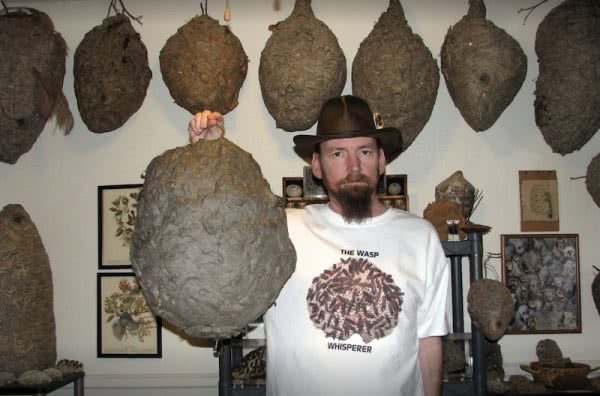
How does wasp nest collecting help you manage your social anxiety?
Well, going to schools, standing in front of a group of people and talking about wasps, I mean that’s a great way to deal with my social anxiety disorder. I think it’s helping me to deal with my mental illness.
The kids and the teachers, they absolutely love it. My giant nests always a big hit with kids and teachers. I’m like a rock star rock star.
Having SAD is horrible, but I forced myself to leave my comfort zone and into these social situations so I can face my fears head-on ’cause I’m sick and tired of having this disorder control my life. So I’m taking back my power and I’m taking back my life.
Collecting wasp nests has helped me because it has given me a purpose in my life, a reason to live. Without this wasp passion of mine, I would be a miserable person. There’s a joy that I get by educating people about wasps so these insects won’t be needlessly killed.
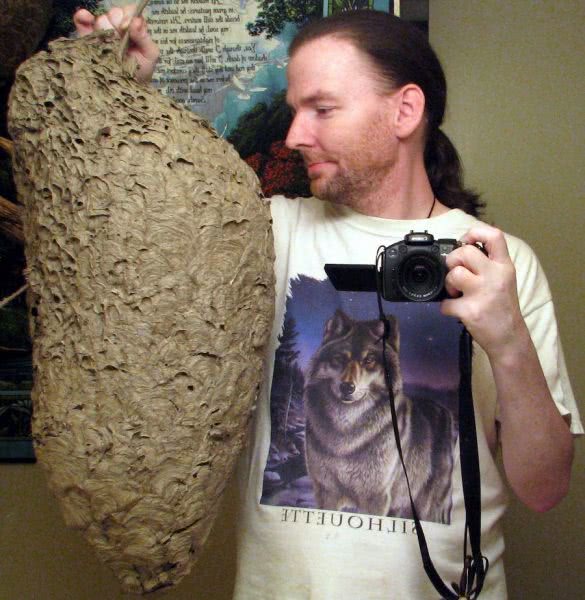
I understand that. Sometimes just watching insects makes me feel so happy because they’re small, they seem insignificant and they can’t really fathom what I am or my life or my problems. Watching insects and they’re just like completely content.
I remember one time I was watching a wasp eat a dead minnow on the side of a river. It just looked so happy and content, this tiny thing in its own little world and it just made me feel like well, why am I so worried about my life?
I think nature really is therapy for me. Nature is what I need because I know animals won’t judge me. It’s not just collecting nests, it is also just observing animals too and just being out in nature and just losing myself in it and then and just I think it’s medicines for the soul.
Anything else that you want people to know about wasps or about your life?
Hornets, yellowjackets, and paper wasps should not be needlessly killed. I understand they need to remove a nest that that has been built in a bad location—however, if a nest is built in an out-of-the-way location on your property, then it should be left alone.
So these beneficial insects can perform pest control duties for you. We need wasps more than they need us.
Troy Farah is a journalist and photographer from California. He has been published in Smithsonian, Undark, Discover Magazine, VICE and others. His website is troyfarah.com and can be found on Twitter @filth_filler
































